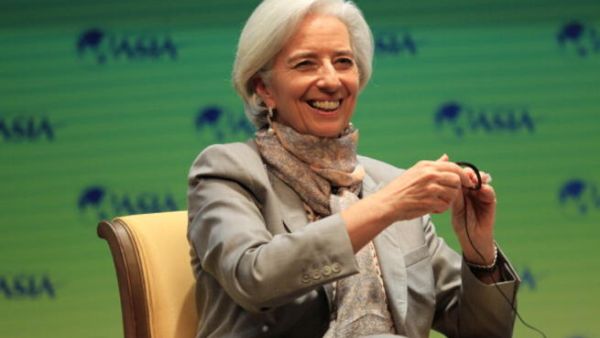Investors welcomed the news that IMF Managing Director Christine Lagarde will visit Cairo next week, hailing it as a positive step. But it is unclear if her trip is intended as a charm offensive to win over skeptics and if it will culminate in the announcement of a long awaited financing package.
In a statement the IMF said Lagarde will visit Egypt on Wednesday August 22nd, just days after the Muslim Eid-El Fetr holiday, at the invitation of the Egyptian authorities. Lagarde’s visit ‘is a reflection of the IMF’s continuous commitment to support Egypt and its people during this historic period of transition.”
Lagarde is expected to meet with President Mohammed Mursi, as well as Prime Minister Hisham Kandil and Finance Minister Mumtaz Al Saeed. She will be accompanied by a team of IMF officials including Masood Ahmed, director of the fund’s Middle East department, who has been involved in loan negotiations with the Egyptian government.
“This is very positive,” Wael Ziada head of research at investment bank EFG-Hermes told Al Arabiya. “For the first time in a while we see the IMF talks progress seriously and in the right direction.”
Angus Blair of the Cairo-based think tank Signet Institute told Al Arabiya it is a ‘very positive message to Egypt’ that Lagarde ‘is coming out herself to see first-hand what is going on.’ He pointed out that the IMF chief called President Mursi a day after he was announced winner in the elections, a move he saw as a sign that she takes an interest in Egypt.
Said Hirsh of research consultancy Capital Economics described Lagarde’s visit as a step forward but cautioned that ‘nothing is guaranteed’ and that negotiations could continue for a longer time. He added that a financing program is needed urgently because ‘Egypt’s financial situation is critical and cannot withstand months of negotiations.”
Others, like Gabriel Sterne at Exotix, a frontier market investment bank, said its ‘feasible’ that an announcement of an IMF program could be made during Lagarde’s visit but that it was certainly not a given.
The news that Lagarde would be paying a visit to the Egyptian capital came on the heels of comments from Finance Minister Mumtaz Al Saeed that Egypt could request a larger than expected loan for $4.8 billion from the fund.
"We will discuss, in the negotiations we are to carry out with the IMF, increasing the loan to $4.8 bln," the finance minister told reporters.
Negotiations with the IMF have been ongoing -in stops and starts - for more than a year over a $3.2 billion financing package. Egypt is estimated to need between $11-12 billion in financing over the near and medium to avoid a balance of payments crisis and plug the gaping budget deficit. The IMF loan is seen as crucial to secure external financing because it would trigger aid from other donors.
The larger loan amount of $4.8 billion, if secured, would go a longer way in plugging Egypt’s financing gap and would reduce the commitments Egypt would need to seek from Arab neighbors and global financing institutions.
The IMF appears to be in a giving mood in the Middle East.
Earlier this month the fund approved a $6.2 billion liquidity facility for Morocco as a buffer against oil price swings and the Eurozone crisis eating its way across the north African country’s main trading partner. The fund also approved a $2.05 billion standby loan arrangement for Jordan to mitigate the effects of external shocks that have hurt energy imports, tourism and investment.
Hirsh says it is clear the IMF is focusing on the Arab region and given that Egypt is the country most in need of support, it is ‘fitting that Christine Lagarde would come to sign it off.’
Some investors like Sterne at Exotix see Lagarde’s visit as a charm offensive aimed at winning over wary Egyptian officials and a highly skeptical public.
"The IMF would benefit from any charm offensive in Egypt because they are - fairly or unfairly- strongly associated with the old regime,” Sterne told Al Arabiya.
“There is a marketing job to do and Christine Lagarde can present the best face of the IMF to try and sell [the financing program] to the Egyptian people,” he said.
Lagarde is known for her charm offensives, having launched a global campaign to win the top job at the fund last year after the unexpected dismissal her predecessor Dominque Straus-Khan. And as France’s Finance Minister, she delicately managed complex negotiations with Germany’s Chancellor Angela Merkel over the eurozone debt crisis.
However, the tone of the visit and the outcome of the meetings will depend to a large extent on Egypt itself. It remains to be seen if there is enough political consensus within the current Mursi administration - and in the light of the political frisson that has accompanied recent changes to military personnel- to agree on an economic program that will include painful but unavoidable reforms to the subsidy system.
The IMF has long stipulated that any aid be contingent upon broad based support, from across the political spectrum, for an economic program. Previous negotiations stalled as a result of political bickering between the Islamist-dominated parliament and the military-appointed cabinet. It is thought that under the current administration, this stalemate can be broken.
“Egypt needs to show that it wants the IMF,” Sterne said. ‘That is just as important as the IMF demonstrating that it wants Egypt.”








